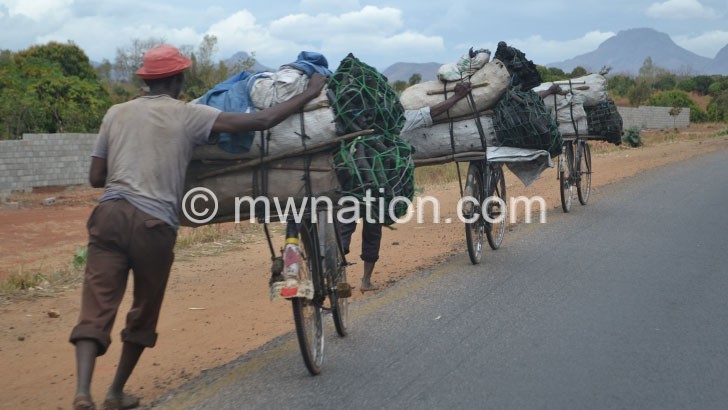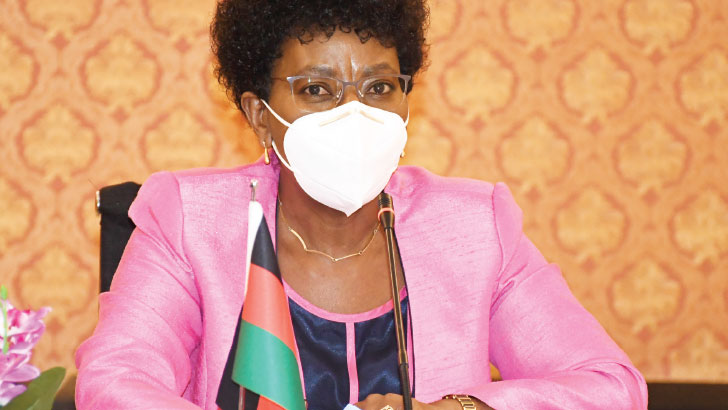The Consumers Association of Malawi (Cama) says the amended 2020 Forestry Act which bans illegal charcoal use should be shelved until government puts in place affordable alternative sources of energy.
The amended law, which treats charcoal as a forest product, allows government to issue stronger penalties, fines and jail sentences as a disincentive to illegal forest activity.
Charcoal dealers on their way to supply the product in Lilongwe
Maximum penalties can reach K5 million or 20 years imprisonment, depending on the severity of the crime.
But Cama executive director John Kapito yesterday said the law will not be effective as over 90 percent of Malawians depend on charcoal and wood as source of fuel.
He said: “Punitive penalties, fines and long jail sentences are not an answer to the charcoal problem. If they enforce this law, then all of us will be arrested.
“What government should do is to shelve this law, and start providing alternative measures.”
Kapito said government can distribute gas appliances to the rural masses and subsidise or remove tax on gas appliances so that they are affordable.
A concerned environmental activist Rodney Salamu, who raised alarm on the new law, yesterday said implementing the 2020 Amended Forestry Act in the current form means the government does not have the welfare of the marginalised at heart.
He said: “More than 90 percent of Malawians use firewood and charcoal for cooking. Even in our public hospitals, barracks, schools, and big events at the household level, we use biomass.
“The government needs to devise ways like those implemented in countries such as Tanzania where gas is subsidised and gas cylinders are distributed to households [at affordable price].”
However, Ministry of Natural Resources and Climate Change deputy director of Forestry Teddie Kamoto backed the law, saying it has contributed “to substantial progress in terms of law enforcement”.
Before the law was passed, law enforcement struggled to investigate, charge, and prosecute deforestation crimes. Each year between 2016 and 2020, prosecutors recorded only 65 convictions for forestry crimes, and the guilty paid an average of K62 500 in fines.
“But in the wake of the new law, courts have been developing their capacity to handle larger caseloads and setting the precedent for convictions under the law,” Kamoto said.
In the first three quarters of 2021 alone, Malawi’s courts recorded 343 convictions and fines averaged K283 000, he added.
Said Kamoto said: “The courts have also ordered forfeiture of more than 20 vehicles for being found transporting charcoal in half a year of implementing the Act. So we just need sensitising key stakeholders on the importance of the law.”
However, he agreed on the need for alternatives as only 11 percent of Malawians are connected to the grid.
“That is why we are promoting the use of gas, briquettes and charcoal pellets to replace illegal charcoal,” Kamoto said.
He further said plans are underway to give out a minimum of two licences in each district to achieve the required need for sustainable charcoal.
Addressing a joint media briefing yesterday in Blantyre, Civil Society Network on Climate Change (Cisonecc), a grouping of 10 environmental groups, said the law was created to sustainably manage the forest for the future generation.
Cisonecc national coordinator Julius Ng’oma said if the nation fails to protect its forests now, the country’s forests will be gone in 10 to 15 years, with devastating impacts on the country’s economy.
He said: “While we sympathise with the public, scrapping the law is not an option, it will be suicidal.”
Centre for Environmental Policy and Advocacy executive director Herbert Mwalukomo use of charcoal is too high in the country; hence, action is required.
The post Amended Forestry Act draws criticism appeared first on The Nation Online.
 Moni Malawi
Moni Malawi 

